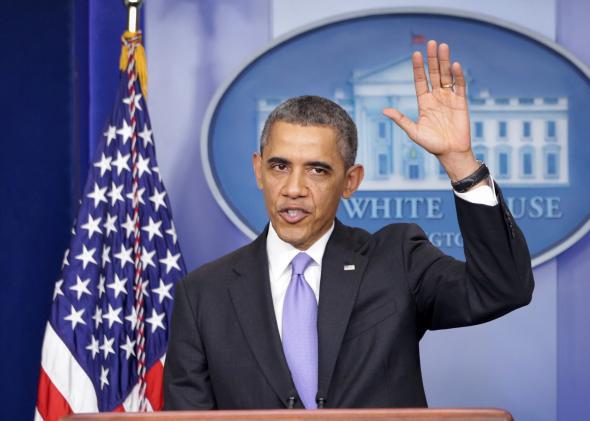Presidents aren’t allowed to admit mistakes in public. So when President Obama was asked during his news conference today what mistake he had committed in the last year, he gave a mushy answer. George W. Bush had trouble with the same question. President Obama answered at greater length than Bush—580 words!—but with the same lack of substance. He talked about his health care website and how lines of communication were blurry and the procurement process wasn’t very good. Those are problems, not mistakes, and certainly not mistakes he made.
Politically it’s understandable why presidents don’t admit mistakes. Why give your enemies a weapon? They’ve already got plenty, and if you’re candid about mistakes, you just give them a bigger one. Still, it’s a shame. A central challenge for any president is whether he can accurately assess reality, recognize what is working and what isn’t, and then make changes. What’s tantalizing and frustrating about Obama is that he certainly appears to know that he made mistakes, he just doesn’t want to tell us, or tell us what he learned from them. Obama has added more staff recently in apparent recognition that he has problems, but he won’t let us in on the thinking behind the moves.
Adaptation is required of any high-performing executive. If you take risks, you often fail. Trial and error is a powerful way to solve problems. To succeed you’ve got to be able to iterate and move on. One of the qualities for which Ben Bernanke is being heralded as he finishes his tenure at the Fed is his ability to think creatively when all options seemed foreclosed.
Presidents used to be open about the certainty of failing and adapting. FDR talked about “bold, persistent experimentation.” But presidents are encased in flattery, sycophancy, and groupthink. Most of us know when we’ve made a mistake; a president has lots of people trying to fool him. But at the same time, a president is criticized for every tiny thing, sometimes beyond all reason. So a president and his staff must also ignore a lot of stupid criticism or they’d never get anything done.
Asked about his tough year, President Obama explained that he had his head down and he was focused. “As long as I’ve got an opportunity every single day to make sure that in ways large and small I’m creating greater opportunity for people … I’ll take it.” He’s grinding away despite the low poll numbers and the second-guessing.
Almost every presidential decision can fail. No call is easy. This is why George W. Bush famously said he didn’t look back. Every single decision can be second-guessed. But President Obama also boasted about a trait that Bush never admitted to. “It’s not that I don’t engage in a lot of self-reflection here. I promise you,” he said in response to a question by ABC’s Jonathan Karl. “I probably beat myself up, you know, even worse that you or Ed Henry does on any given day.”
But if the president is engaging in that kind of self-reflection, he’s not letting us in on the conclusions. His administration, which like many before it is insular and prizes loyalty, shows no particular outward signs of the persistent adaptation that might flow from self-reflection. So is the president just being coy for political reasons, or is his self-reflection actually self-delusion? When Bush wasn’t able to answer whether he had made any mistakes, it was seen as a demonstration that he lacked the ability to evaluate his own performance. President Obama says he is constantly engaged in self-evaluation, but whether his findings are valid and he’s putting them to good use is something we’ll have to just take on faith. We’ll have to wait until next year to see if anything really has changed.
